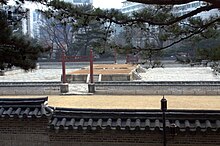Sajikdan
| Sajikdan | |
|---|---|
 The shrine in 2014 | |
| Religion | |
| Affiliation | Korean Confucianism |
| Location | |
| Location | Seoul, South Korea |
| Geographic coordinates | 37°34′33″N 126°58′04″E / 37.5757°N 126.9677°E |
| Architecture | |
| Date established | 1395 |
 | |
| Korean name | |
| Hangul | 사직단 |
| Hanja | 社稷壇 |
| Revised Romanization | Sajikdan |
| McCune–Reischauer | Sajiktan |
Sajikdan (Korean: 사직단) is a Neo-Confucian altar located in Sajik-dong, Jongno District, Seoul, South Korea.[1] It was built and used during the Joseon period to perform rituals related to soil and grain.[2][3]
Description
When Seoul was founded during the Joseon period, the location of Sajikdan was prescribed by the ritual bureaucratic text Rites of Zhou.[1][4] The shrine was created in 1395.[4] Along with the royal palace Gyeongbokgung and the shrine Jongmyo, Sajikdan is a fundamental symbol of the new capital city.[4]
On this square altar were honored on key moments of the lunar calendar the national deities of earth (Sa) and grains (Jik).
Certain ceremonies have been recently revived in the square altars.
See also
- Hwangudan, a separate altar in Seoul
- Esplanade of Sacrifice to the Heaven and Earth, Huế, Vietnam
- Shejitan, Beijing
References
- ^ a b 권, 영창, "사직단 (社稷壇)", Encyclopedia of Korean Culture (in Korean), Academy of Korean Studies, retrieved 2024-06-18
- ^ Treasures 177 Cultural Properties Administration
- ^ Historic Sites 121 Cultural Properties Administration
- ^ a b c "Sajikdan Altar and Its History". Royal Palaces and Tombs Center. Cultural Heritage Administration. Retrieved June 18, 2024.
External links
- 서울사직단(seoul社稷壇)(in Korean) at the Seoul Metropolitan Government site.
